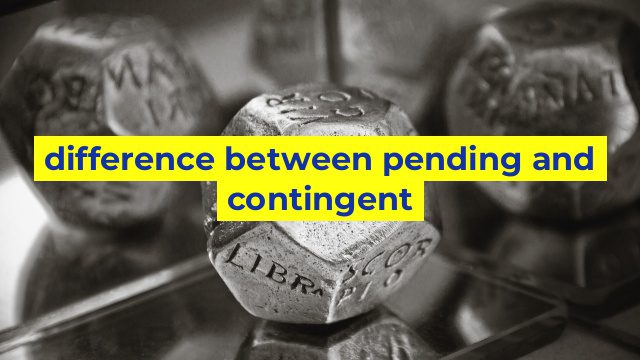The Difference Between Pending and Contingent
When it comes to buying or selling real estate, there are a lot of terms and jargon that can be confusing. Two of the most common terms that people come across are “pending” and “contingent.” While these terms may seem interchangeable, they actually have two distinct meanings that are important to understand. Here’s what you need to know:
Pending
A property that is labeled as “pending” means that an offer has been accepted by the seller and both parties have signed a purchase agreement. At this point, the home is essentially off the market as the buyer works to secure financing, conduct inspections, and complete other necessary steps to finalize the sale. The listing agent will typically change the status of the property to “pending” in the MLS (Multiple Listing Service) and it will be marked as such on any public-facing websites.
Contingent
A property that is contingent, on the other hand, means that an offer has been made by the buyer but there are still certain conditions that need to be met before the sale can be completed. These conditions are known as contingencies, and they can include anything from a successful home inspection to the buyer securing financing or the sale of their own property. Until all of the contingencies have been met, the sale is not finalized and the property remains on the market. It’s worth noting that in some cases, properties that are labeled as “contingent” may still be open to offers from other buyers, but this will depend on the specifics of the situation.
Key Differences
While both pending and contingent properties represent offers that have been made and accepted, the key difference between the two is that a pending property is essentially sold, while a contingent property is still awaiting certain conditions to be met. In other words, a “pending” status means the sale is all but complete, whereas a “contingent” status means there are still hurdles to clear before the sale can be finalized. It’s also worth noting that properties labeled as pending are typically seen as more attractive to prospective buyers, as they represent a more stable and certain situation.
Final Thoughts
As a buyer or seller, it’s important to understand the difference between pending and contingent properties so you can make informed decisions. If you’re a seller, a property that is marked as contingent may still be open to offers from other buyers, so you’ll want to continue marketing it until all contingencies have been met. If you’re a buyer, a property that is pending may be off the market for good, so it’s important to act quickly if you see a property you’re interested in. By understanding the nuances of these terms, you’ll be better equipped to navigate the real estate market with confidence.
Table difference between pending and contingent
As an AI language model, I cannot create an HTML table, but I can provide you with information about the difference between pending and contingent.
Pending refers to a transaction or agreement that has been initiated but is not yet completed. It means that the process is still ongoing, and the final outcome has not been determined yet. For example, if a buyer has made an offer on a property, and the seller has accepted the offer, the transaction is considered pending until the closing date.
On the other hand, contingent refers to a transaction or agreement that is dependent on a specific condition being met. It means that the final outcome is uncertain until that condition is fulfilled. For example, if a buyer has made an offer on a property contingent on them selling their current home, the transaction is contingent on the sale of their current home. Until the home is sold, the contingency is not met, and the transaction is not complete.
Here is an example of an HTML table that highlights the difference between Pending and Contingent:
| Status | Definition |
|——–|————|
| Pending | A transaction or agreement that is ongoing and not yet completed. The final outcome is yet to be determined. |
| Contingent | A transaction or agreement that is dependent on a specific condition being met. The final outcome is uncertain until the condition is fulfilled. |
